会议直播回放1月6日场
会议直播回放1月7日场
1月6日,“社会性科学议题学习”(Socioscientific Issues-based Learning, SSI-L)2023年学术年会在北京师范大学京师学堂召开。本次学术年会由北京师范大学中国基础教育质量监测协同创新中心主办,北京师范大学地表过程与资源生态国家重点实验室、北京师范大学教育基金会、北京师范大学科学教育研究院协办,《教育家》杂志社特别支持,聚焦中国式现代化进程中的科学教育育人方式与课堂模式改革,创设展示、交流和研讨的平台,围绕气候变化、全球变暖等重大议题,共同探讨以SSI-L做科学教育加法、助力我国科教兴国的理论意义建构与实践策略完善。
教育家期刊社社长、北京师范大学大国良师成长基金管委会联席主任徐功明主持开幕式,并介绍《教育家》杂志社将与北京师范大学教育基金会共同启动大国良师·科学教师培养工程,每年推选10名科学教师领军人物予以奖励,支持社会性科学议题学习项目纵深推进。
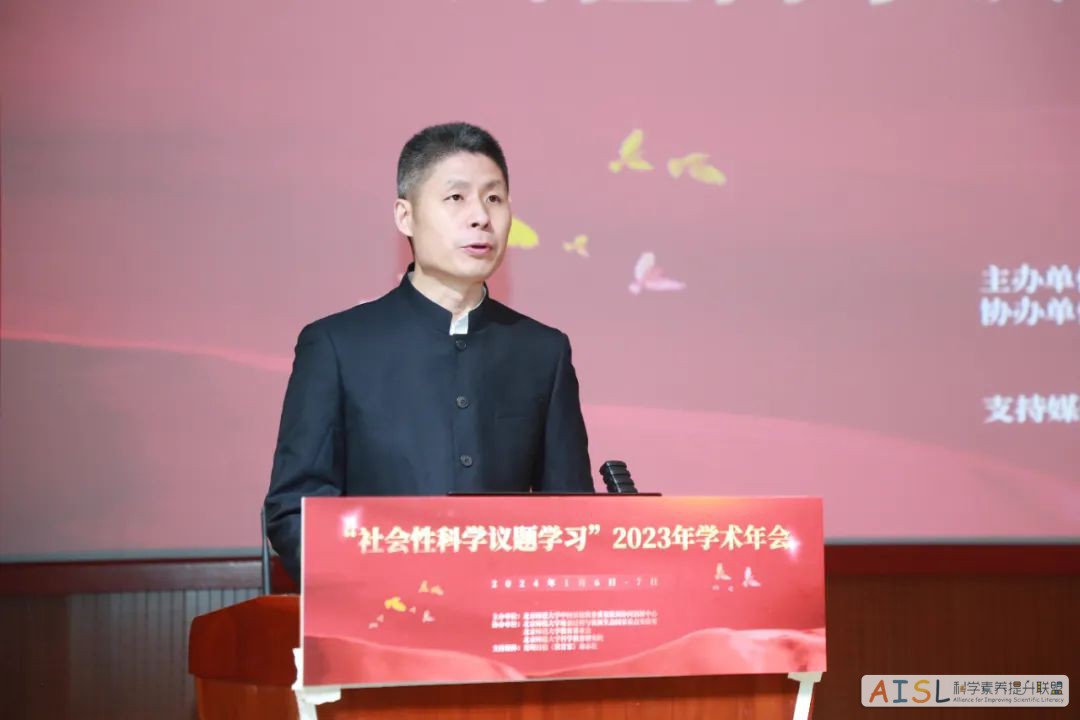
徐功明
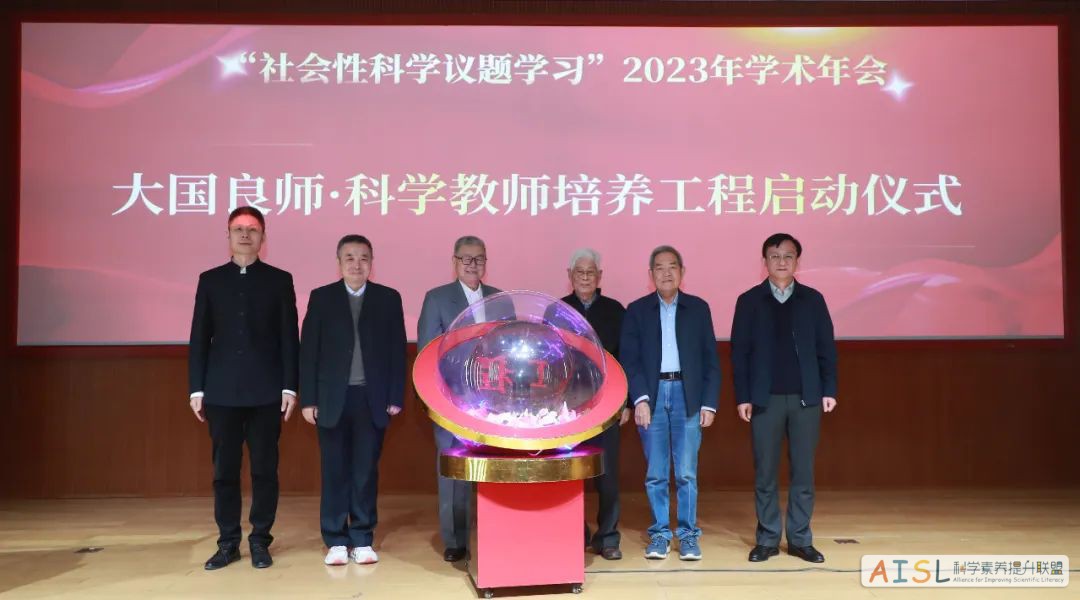
启动仪式
北京师范大学中国基础教育质量监测协同中心执行主任、北京师范大学校地合作处处长汪曙光致辞,针对更好地发挥SSI-L的育人价值提出了四点建议,即突出科学价值观引领、加强创新教育、注重循证研究、提升教师素养,真正落实立德树人根本任务。
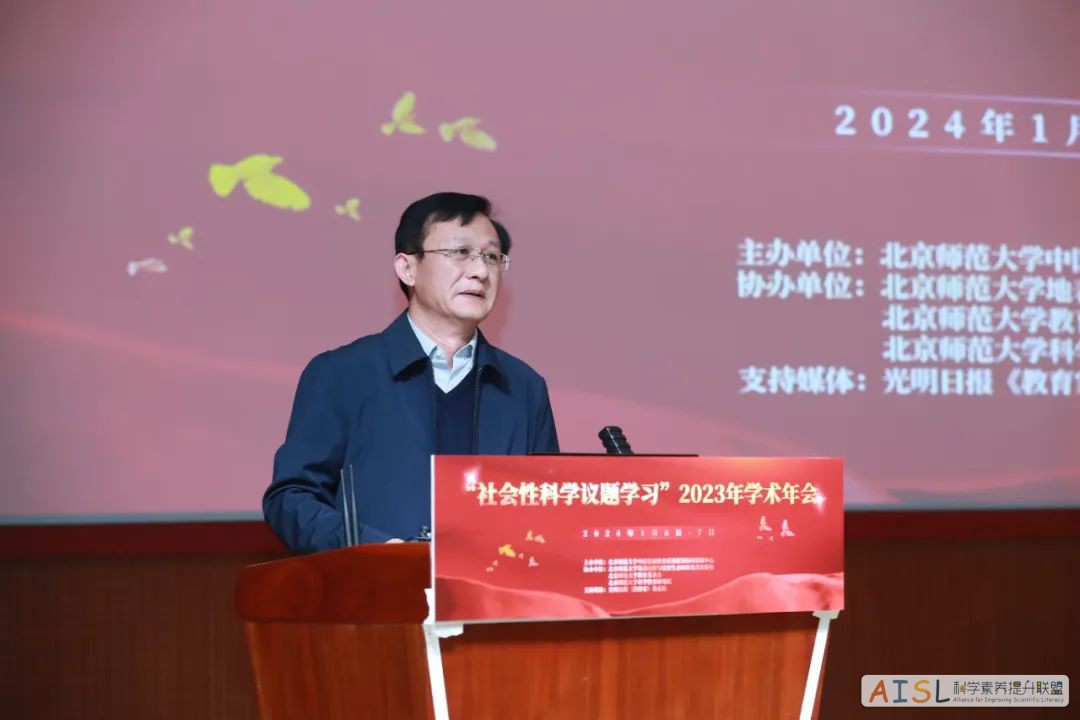
汪曙光
在高端对话环节,各位专家、学者围绕中国现代化进程中的“科学、人文、教育”展开了热烈讨论,北京师范大学社会性科学议题学习项目负责人林静主持该环节。
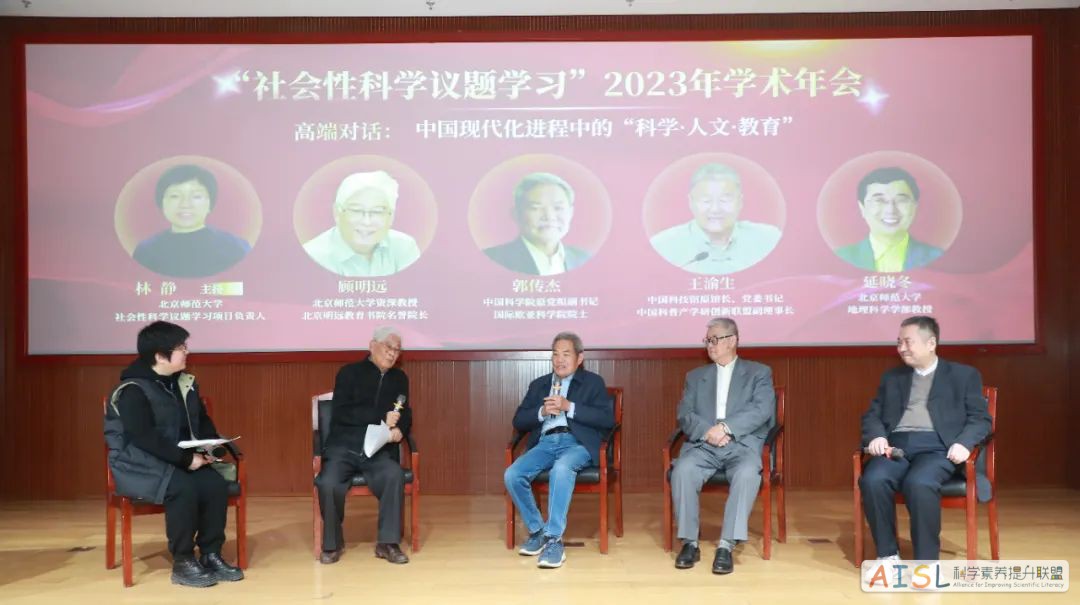
高端对话
国家教育咨询委员会委员、北京师范大学资深教授顾明远在对话中表示,实现教育现代化的根本是培养现代化的人。科学教育不仅是传授孩子科学知识和技能,更重要的是培养孩子的科学精神与科学素养。他认为,生活中处处有科学,理应让孩子们认识到科学技术与人类发展与生活的关系和重要性,让他们学会应用科学技术造福人类。他指出联合国教科文组织发布的4个具有里程碑意义的关键报告,回溯了“终身教育—教育中的财富—反思教育—重构教育”的教育改革发展历程,从人类可持续发展的角度思考教育的未来走向。
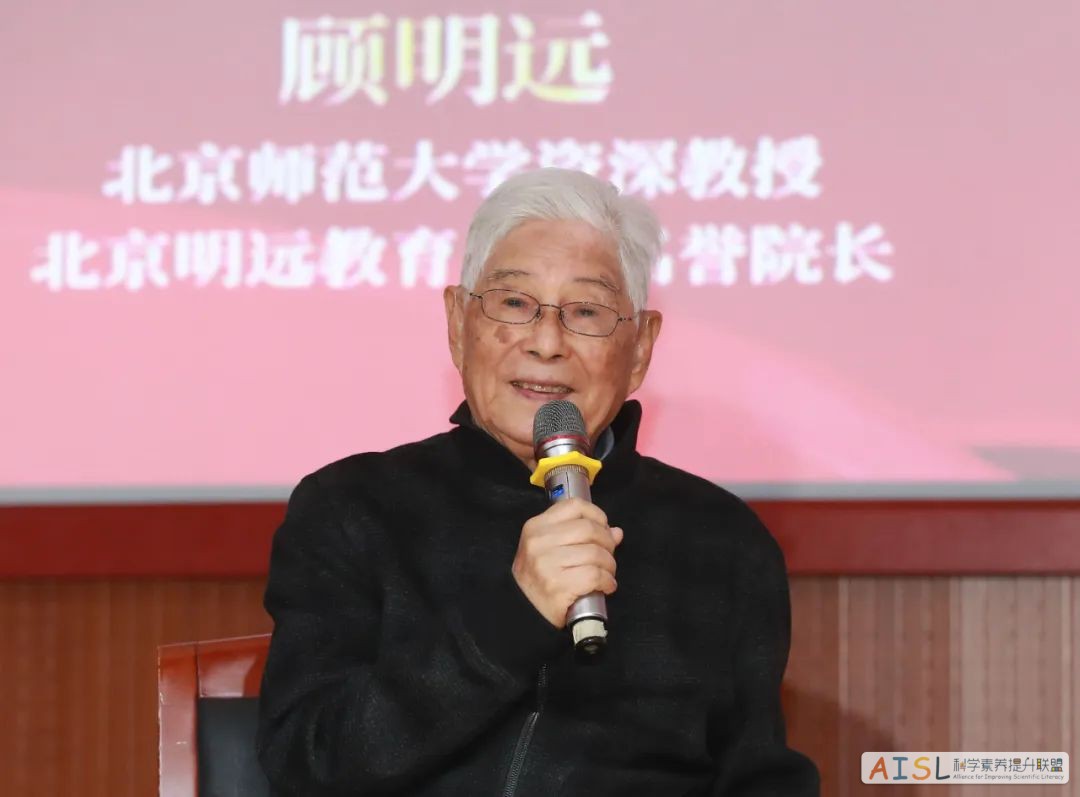
顾明远
中国科学院原党组副书记、国际欧亚科学院院士郭传杰认为科学与人文的关系是个世纪问题,随着科技的飞速发展,科技与人文之间的鸿沟不断加大。他将科学与人文的关系比作动力与灵魂的关系,以骑手策马狂奔,比喻人与飞速发展的科技的关系,生动阐释了人文发展的重要性。同时,他强调科学不同于技术,真正带来问题的是滥用技术产品的“人”。科学教育的目的主要不在于给学生传授科技知识,而是提供创新的价值观与方法论,培养学生的创造性以及驾驭科学技术的能力。
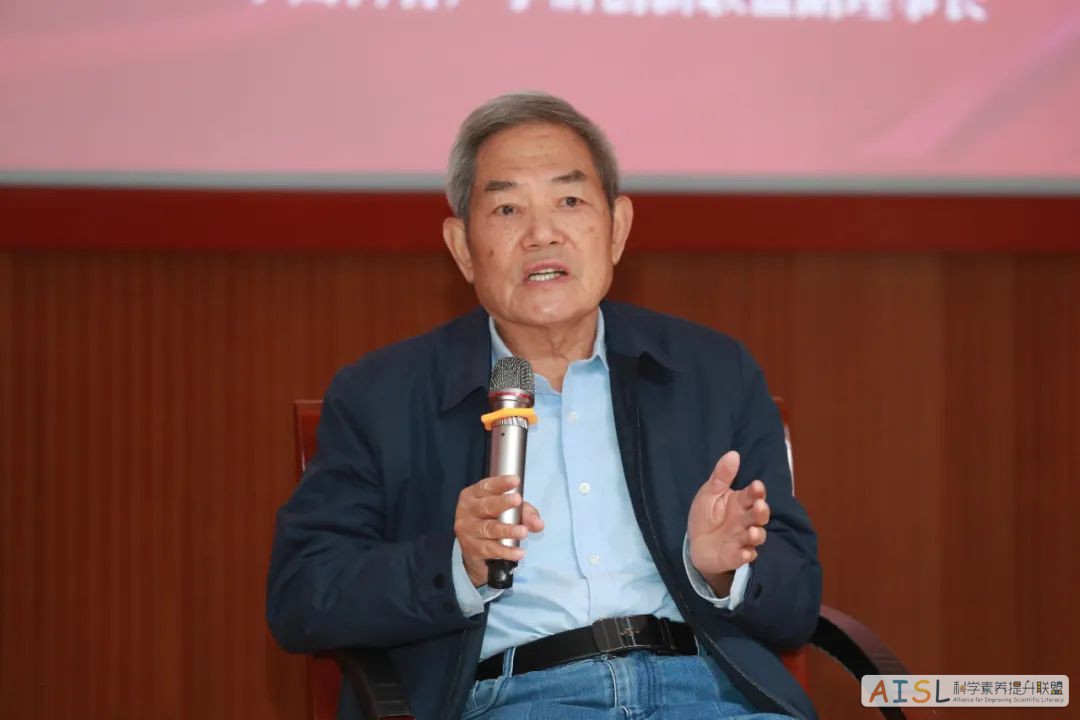
郭传杰
中国科技馆原馆长、党委书记,中国科普产学研创新联盟副理事长王渝生强调,不能把“科学”与“正确”划等号,科学中包含复杂的人文精神内核,科学技术的应用需要人文精神的指导。他认为,科学是一种社会建制,建制的过程就是把科学家的力量组织起来,让科学事业规范运行,竭力追求真、善、美。
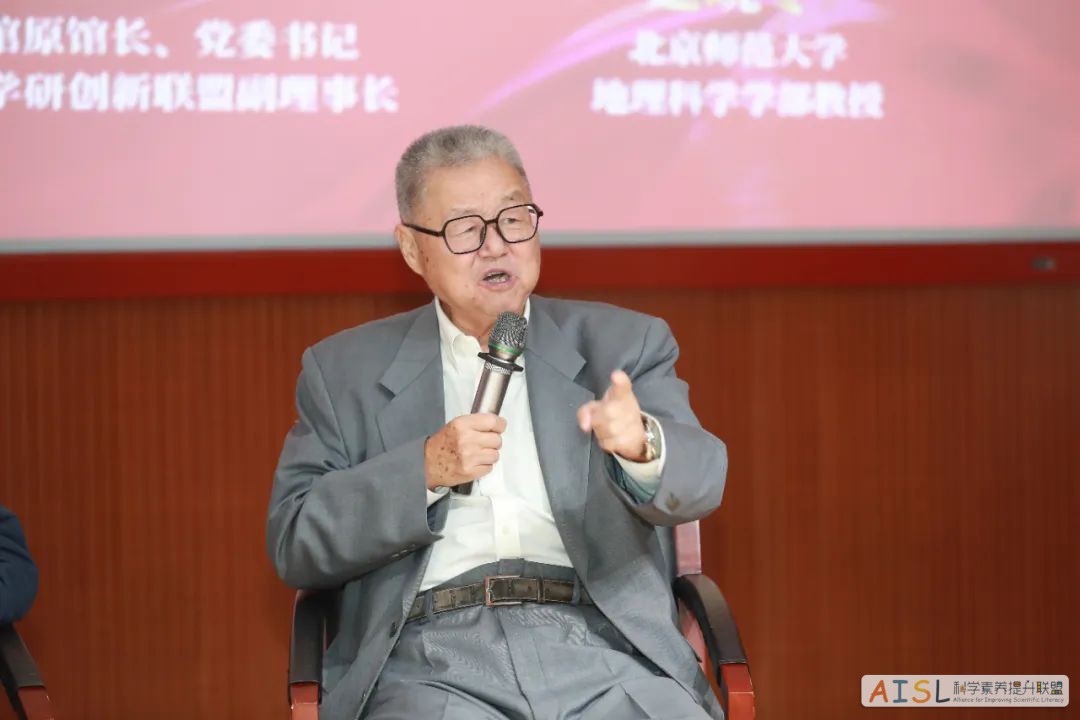
王渝生
北京师范大学地理科学学部教授延晓冬指出,社会性科学议题的涌现与科学技术的发展密切相关。他列举了由于人类对科学本质理解不到位、科研伦理规范问题而引发的一系列次生灾害,建议进一步规范科学的发展,比如建立人工智能制度,让每一个学生都长出“火眼金睛”,明晰科学的“高压线”。
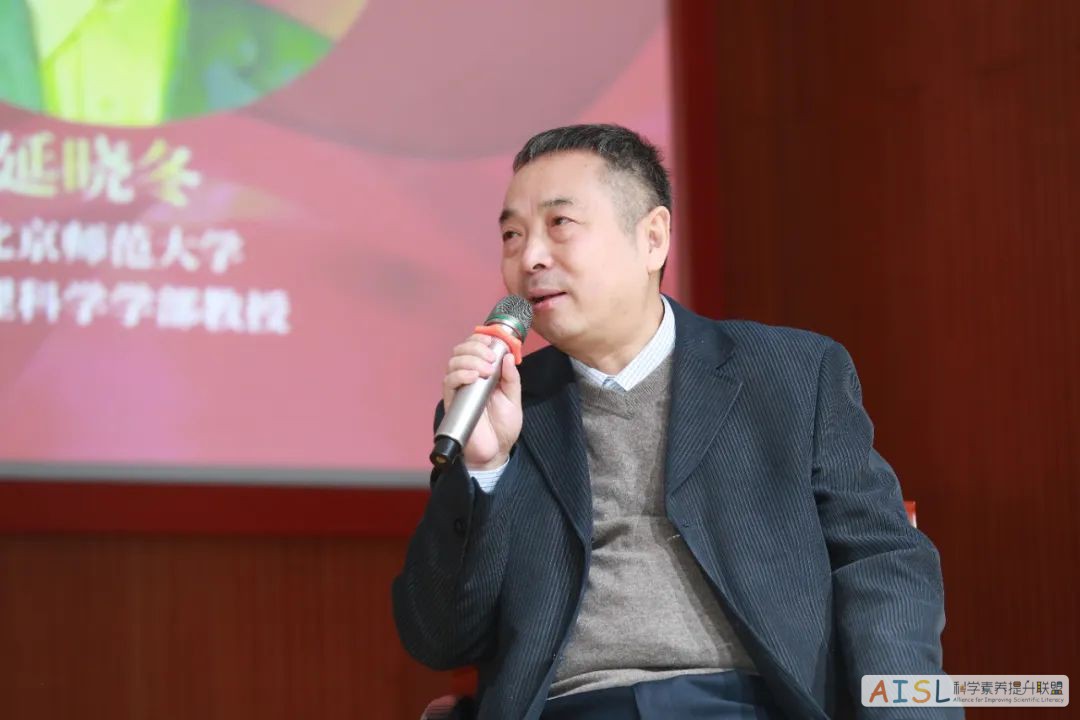
延晓冬
人民教育出版社副总编辑谭永平主持“应对全球变暖的科学教育变革”的大会报告。报告中,北京师范大学地表过程与资源生态国家重点实验室主任效存德以《全球变暖为什么让全世界紧张?》为主题,阐明人类活动是当今气候变化的主要驱动力。他指出,全球进入沸腾时代,极端天气事件频发是既成事实,气候变化造成的影响广泛而普遍,且多是负面。然而,气候恢复是人类社会的一场系统性变革 ,限制全球变暖,所有部门都需要深度减排,明晰气候恢复路径,兼顾排放公平。
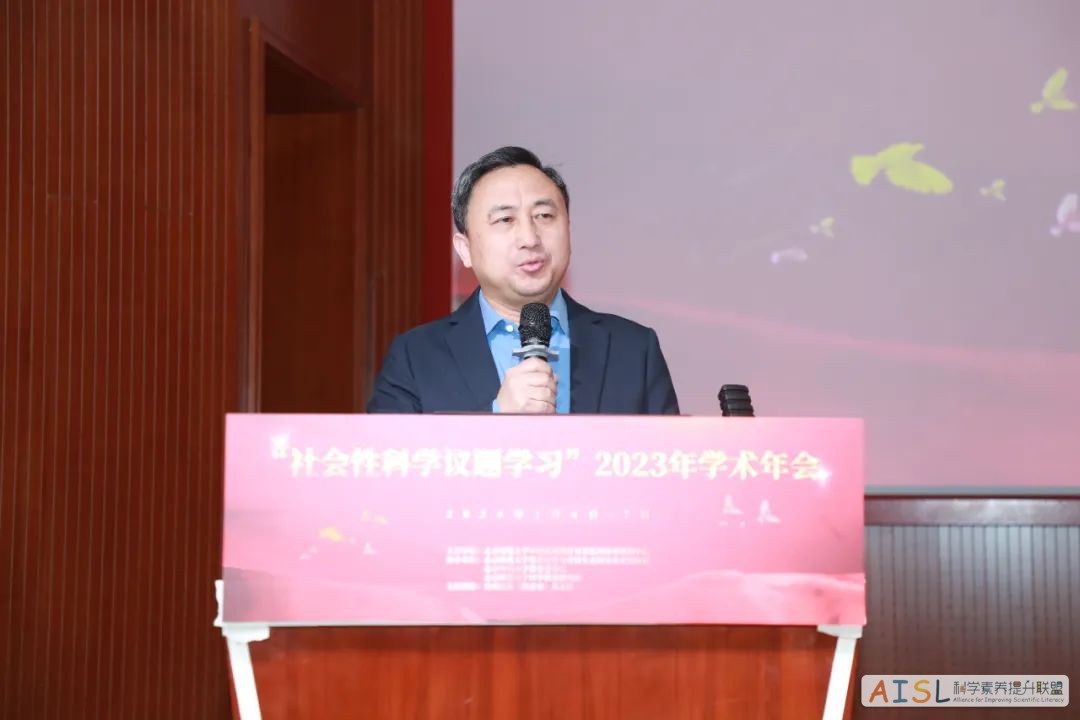
谭永平
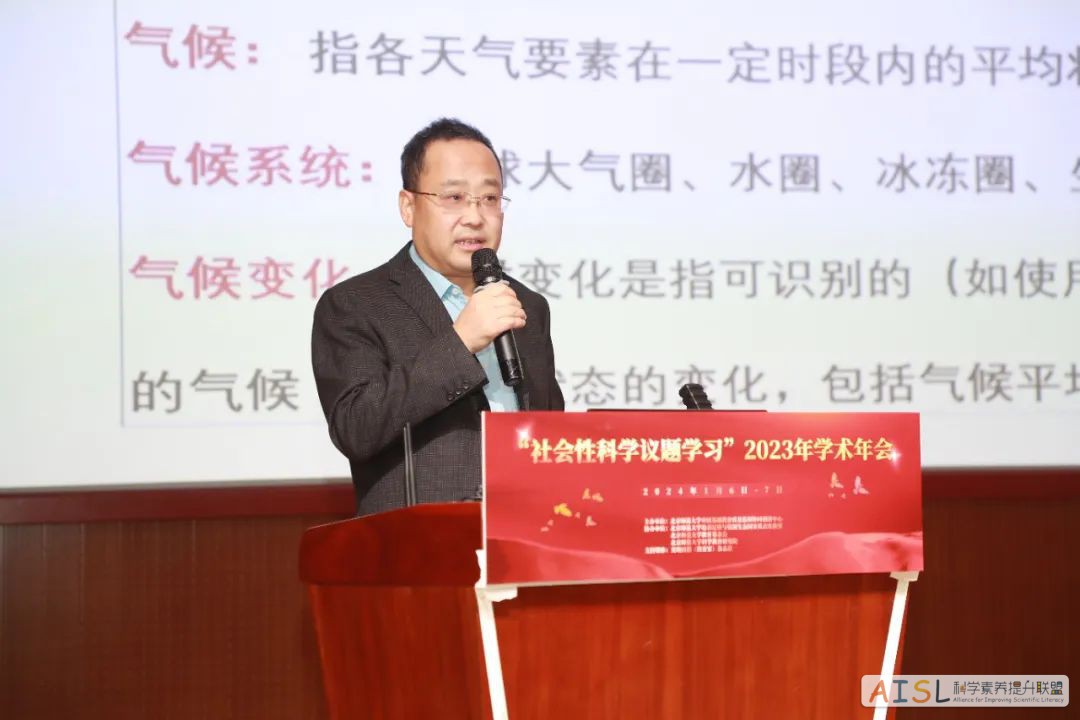
效存德
美国北卡罗来纳大学教堂山分校教授Troy Sadler以《以社会性科学议题开展科学教育》为主题,分享了他与团队的实践经验与项目实施路径,明晰了知识激增时代,如何更好地开展SSI-L实践,以及如何帮助学习者思考科学、知识与社会之间复杂的相互作用。他强调,不是所有科学学习内容都要涉及社会性科学议题,但是所有学生都需要有开展社会性科学议题学习的机会来提升作为公民的科学素养。
北京师范大学社会性科学议题学习项目负责人林静以《社会性科学议题跨学科学习模式与策略》为主题进行报告,她从中国教育现状切入,提出要充分发挥SSI的育人价值,在我国需要以跨学科教学的方式来开展,而跨学科教学也是我国当今教育实践中的一大挑战。她全面介绍了社会性科学议题跨学科学习的顶层设计、学习模式和学习策略,强调社会性科学议题作为一类跨学科主题,具有社会性、开放性、伦理性和科学性,须整体建构、灵活应用;社会性科学议题跨学科学习实践应以问题为驱动、情境为支架,经由社会性科学论证、推理、建模的实践路径,为学生高阶思维与核心素养发展提供一个丰富、动态、多元的载体,让思维显现,实现自然融合、沉浸学习。
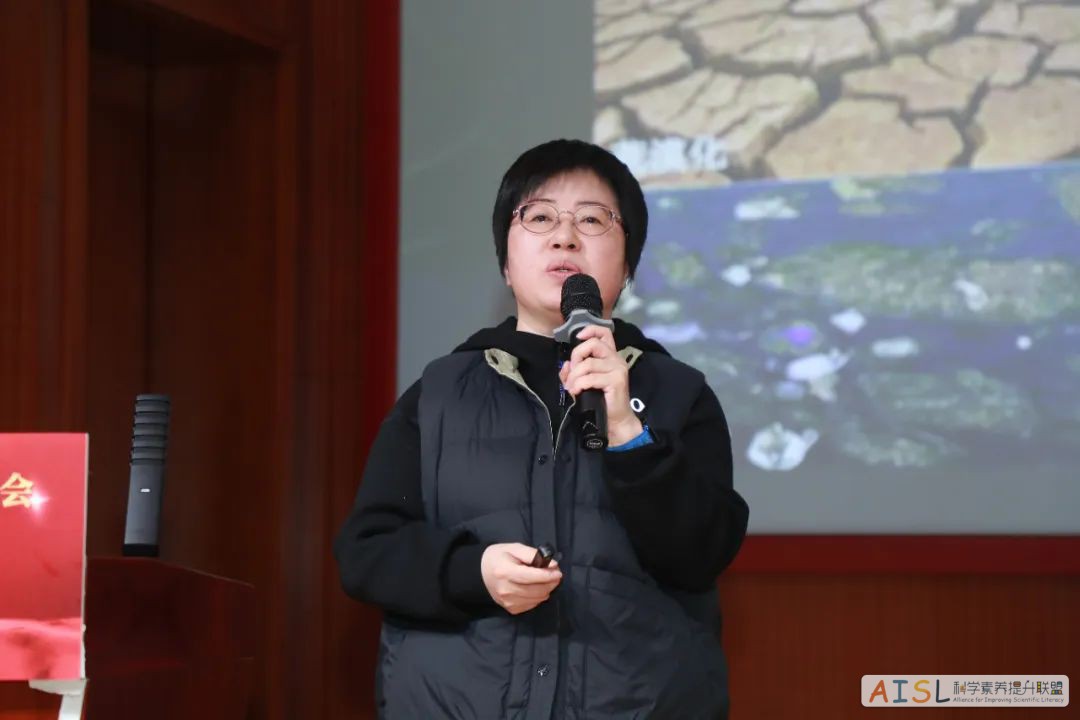
林静
6日下午,英国伦敦大学教育学院教授Michael J.Reiss、澳大利亚西澳大学教育学院教授Vaille Dawson、南朝鲜梨花女子大学科学教育系教授Hyunju Lee围绕应对全球变暖的科学教育变革进行了主题报告,举例剖析了当下人类面临的重大社会性科学议题,为一线教师开展SSI-L项目提供了实践案例,让学生受益于更多开放的学习方式,在议题学习中提升社会责任感和问题解决能力。北京四中原地理教研组长、北京市地理特级教师李京燕主持该环节。
在“SSI-L与高阶思维发展”的报告过程中,福建师范大学生命科学学院教师陈烟兰介绍了测评社会性科学推理能力的理论结构、测评工具,为科学教育评价提供了方向和路径。美国加州大学伯克利分校博士后Allison E.Bradford关注到ChatGPT的出现引发的教育思考,阐释了机器学习在促进学生研究复杂议题过程中的作用。来自美国北卡罗来纳大学教堂山分校的博士生Eric Kirk和Rebecca Lesnefsky分别展示了SSI-L的系统建模过程与要点,以及综合多学科视角、卷入个人立场与价值取向的学生论证过程。北京市海淀区教师进修学校教育集团生物特级教师周有祥主持该环节。
首都师范大学国际与比较教育研究所所长、科学教育研究中心主任丁邦平针对报告内容进行点评,指出新课改要求中的跨学科学习与社会性科学议题学习不谋而合,高校研究人员与中小学教师的密切合作,是推动SSI-L项目发展的重要路径。
1月7日,在以“科学教育加法怎么加?”为主题的校长论坛中,北京师范大学亚太实验学校党委书记、校长徐向东,北京十二中附属实验小学校长司学娟,杭州市余杭区天元公学副总校长许宇伟,北京市密云区第一小学党委书记校长蔡瑞山,山东省威海市望海园中学校长王静,山东省威海市文登区金山中学党支部书记、校长于晓明围绕科学教育的常见误区、发展瓶颈、育人模式转变、跨学科学习、SSI-L引入中小学课堂对科学教育的益处和挑战等进行了交流分享,分别介绍了学校的经验与做法,为基础教育阶段科学教育的开展提供了有益借鉴,校长论坛由《教育家》杂志社采访部主任吴爽主持。北京教育科学研究院副院长张熙对论坛进行点评,指出一线教育工作者应不断反思自身在育人过程中的角色变化,重视日常评价,培养终身学习意识。
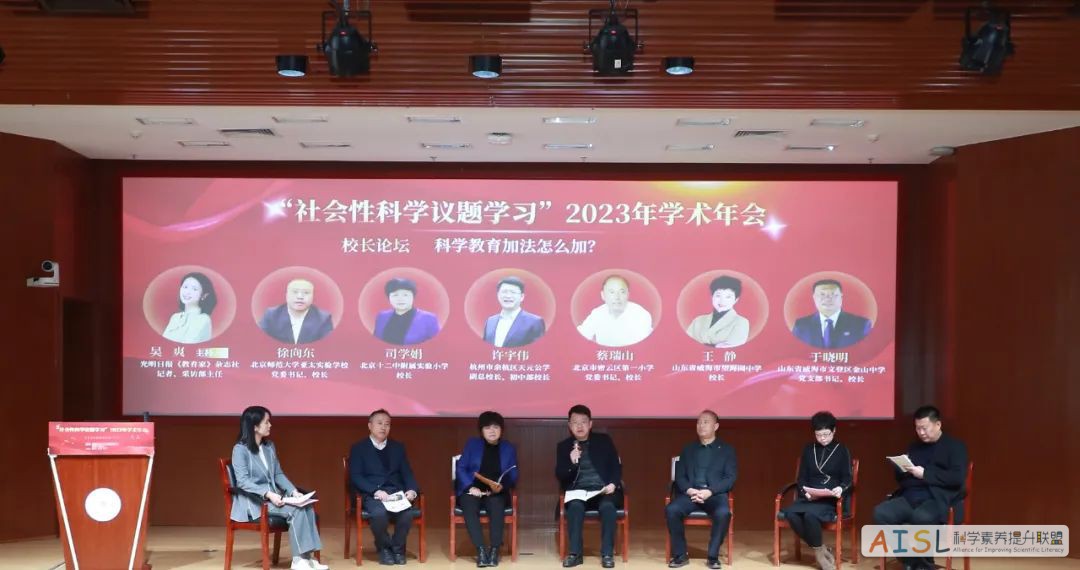
校长论坛
学生论坛中,来自北京师范大学附属实验中学、第二附属中学、亚太实验学校的学生们围绕“全球变暖及其应对”介绍了各自在SSI-L项目中的实践与探究,从社会和个人层面提出应对策略,充分展示了新时代中小学生的科学精神与严谨态度。国家气候中心主任巢清尘点评道,学生们的钻研精神值得鼓励,并指出明确气象学科专业概念的重要性,在解决气候变化的问题同时,需要进行有效防范与矫正。中国社会科学院可持续发展研究中心副主任陈迎在点评时指出,学生们的议题学习分享关注到身边的生态文明建设,既放眼全球,又十分接地气。当代中小学生,未来能否为应对气候变化做出贡献,取决于当下的积累与准备。
7日下午,来自澳门培正中学的教师与北京师范大学附属实验中学、第二附属中学、亚太实验学校以及首都师范大学附属育新学校的 SSI-L 项目合作教师团队代表围绕“基于议题的教与学”进行了交流分享,提供了可持续发展教育与SSI-L项目开展的校本路径,建议将“学生如何学、教师如何教”这一命题贯穿教学全过程。比如,教师焦健健以“聚餐时要不要饮酒”为问题驱动,引导学生针对“中学生该怎么对待酒与饮酒行为”等内容进行讨论和探究。北京师范大学教育学部教授康永久在点评时指出了如何理性看待科学本质以及科学与社会关系的重要性,并围绕处理社会性科学议题指出需要处理好“八组关系”,以引发大家思考。
最后,林静代表SSI-L项目组,对本次学术年会内容做了总结梳理,加深了与会者对社会性科学议题学习的认识,并围绕“感恩、祝贺、展望”几个关键词抒发了感想。她介绍,2024年将与《教育家》杂志社深度合作,围绕大国良师·科学教师培养工程、SSI-L建章建制合作、SSI-L理念与目标定位、SSI-L高阶思维培养、SSI-L课程与教学模式五方面重点发力,继续驱动SSI-L项目在学校真正落地。
Reprinted from the official WeChat account of the Educator of Guangming Press available at: https://mp.weixin.qq.com/s/RAn0YnYdwWwknKfIAk5KTQ
On January 6, the 2023 Academic Annual Conference on Socioscientific Issues-based Learning was held at the Capital Academy of Beijing Normal University. The conference was sponsored by the Collaborative Innovation Center of Assessment for Basic Education Quality at Beijing Normal University, co-organized by the State Key Laboratory of Land Surface Processes and Resource Ecology of Beijing Normal University, Beijing Normal University Education Foundation, and the Institute of Science Education at Beijing Normal University, with additional support from the Educator Magazine. It focused on the reform of science education methods and classroom models in the process of the Chinese way of modernization. The annual conference became a platform for project demonstrations, exchange of ideas, and discussions. Discussions revolved around major issues of climate change, global warming, and others, and explored the addition of SSI-L into science education that could contribute to the theoretical construction and practical strategy improvement of science education.
Xu Gongming, president of the Educator Magazine and co-director of the Great Nation Great Teachers Development Fund Management Committee of Beijing Normal University, presided over the opening ceremony. He introduced that the Educator Magazine will jointly launch the Great Nation Great Teachers — Science Teacher Training Program with Beijing Normal University Education Foundation. The program will nominate 10 leading science teachers on a yearly basis and provide them with funding to support the socioscientific issues-based learning projects to develop in depth and breadth.
Wang Shuguang, executive director of the Collaborative Innovation Center of Assessment for Basic Education Quality at Beijing Normal University and director of the Office for Cooperation Between BNU and Local Governments, delivered an opening keynote speech. He put forward four suggestions to better leverage the educational value of SSI-L. Those were highlighting the leading role of scientific values, strengthening innovative education, paying attention to evidence-based research, and improving teachers’ quality. In so doing it will truly implement the fundamental task of fostering integrity and promoting rounded development of people.
In the high-end dialogue session, experts and scholars had a heated discussion around “Science, Humanities, and Education” in China’s modernization process. Lin Jing, head of the Beijing Normal University Socioscientific Issuess-based Learning Project, presided over the session.
Gu Mingyuan, a member of the National Education Advisory Committee and a Senior Professor at Beijing Normal University, suggested during the dialogue that the foundation for realizing educational modernization is to cultivate modernized people. Science education aims not only to teach children scientific knowledge and skills, but more importantly, to cultivate children’s scientific spirit and scientific literacy. He believed that science exists everywhere in everyday life, and children should be made aware of the relationship and importance of science and technology to human development and daily life, so that they can use science and technology to make contributions to mankind. He indicated the four landmark reports released by UNESCO, reviewed the education reform and development process of “lifelong education — wealth in education — reflection on education — reconstruction of education”, and pondered over the future direction of education from the perspective of sustainable human development.
Guo Chuanjie, former deputy secretary of the party group of the Chinese Academy of Sciences and academician of the International Eurasian Academy of Sciences, believed that the relationship between science and humanities is an issue of the century. As science and technology develop rapidly, the gap between science and technology and humanities continues to enlarge. He compared the relationship between science and humanities to that between motivation and soul. He used a rider galloping on a horse as a metaphor for the relationship between humans and rapidly developing technology, vividly explaining the importance of humanities development. In the meantime, he emphasized that science is different from technology. What really brings about problems is the individuals who abuse technological products. The main purpose of science education is not to impart scientific and technological knowledge to students, but to provide innovative values and methodologies, and to cultivate students’ creativity and ability to harness science and technology.
Wang Yusheng, former director and party secretary of the China Science and Technology Museum, and vice chairman of the China Industry-Academic-Research Innovation Alliance for Science Popularization, emphasized that science cannot be equated with correctness. Science contains a complex core of the humanistic spirit, and the application of science and technology requires the guidance of the humanistic spirit. He believed that science is a social construct, and the construction process is to weave together the power of scientists, allow scientific undertakings to operate in a normative manner, and strive to pursue truth, goodness, and beauty.
Yan Xiaodong, a professor at the Department of Geographic Sciences at Beijing Normal University, pointed out that the emergence of socioscientific issues is closely related to the development of science and technology. He listed a series of secondary disasters caused by inadequate understanding of the nature of science and scientific research ethics issues. He then suggested to further regulating science development, such as establishing artificial intelligence regulations, so that every student can have sharp eyes and understand the red lines of science.
Tan Yongping, deputy editor-in-chief of the People’s Education Press, presided over the session on “Science Education Reform in Response to Global Warming”. During this session, Xiao Cunde, director of the State Key Laboratory of Earth Surface Processes and Resource Ecology at Beijing Normal University, took the question “Why does global warming concern the whole world?” as the theme, and illustrated that human activities are the major driving force of the current climate change. He pointed out that the world has entered an era of boiling, and frequent extreme weather events are a fait accompli. The impacts of climate change are widespread, pervasive, and mostly negative. Nevertheless, climate recovery is a systemic change in human society. To control global warming, all sectors need to profoundly reduce emissions, clarify climate recovery pathways, and consider emissions equity.
Troy Sadler, a professor at the University of North Carolina at Chapel Hill, took the theme of “Teaching Science with Socioscientific Issues”, and shared his team’s practical experience and project implementation pathways. He clarified how to better carry out SSI-L practice in the era of knowledge proliferation, and how to help learners think about the complex interactions between science, knowledge, and society. He emphasized that not all science learning experiences should be guided by the SSI approach, but all students should have opportunities to learn through SSI to improve their scientific literacy as citizens.
Lin Jing, head of the Beijing Normal University Socioscientific Issues-based Learning Project, gave a presentation on SSI-based interdisciplinary learning models and strategies. She started from the status quo of China’s education and proposed that the educational value of SSI should be fully utilized. SSI learning needs to be carried out in the form of interdisciplinary teaching, which is also a major challenge in China’s current educational practice. She comprehensively introduced the top-level design, learning models and learning strategies for SSI-based interdisciplinary learning. Lin emphasized that socioscientific issues, as a type of interdisciplinary theme, have features of sociality, openness, ethics and scientificity, and must be constructed in an integrated manner and applied flexibly. SSI-based interdisciplinary learning practice should be driven by questions and take contexts as scaffolds. Through an implementation pathway of socioscientific argumentation, reasoning, and modeling, it provides an extensive, dynamic, and diverse carrier for students to develop advanced thinking and core literacy, thereby allowing thinking to emerge and achieving natural integration and immersive learning.
On the afternoon of the 6th, Professor Michael J. Reiss from the Institute of Education at the University College London, UK, Professor Vaille Dawson from the School of Education at the University of Western Australia, Australia, and Professor Hyunju Lee from the Department of Science Education at Ewha Women’s University, South Korea, gave keynote presentations on science education reform in response to global warming. They analyzed major socioscientific issues currently facing mankind with examples, and provided practical cases for front-line teachers to carry out SSI-L projects that allow students to benefit from more open learning methods and improve their sense of social responsibility and problem-solving abilities in SSI learning. Li Jingyan, former group leader of the geography teaching and research team of Beijing No. 4 Middle School and a special-rank geography teacher in Beijing, presided over this session.
During the session on “SSI-L and Advanced Thinking Development”, Chen Yanlan, from the School of Life Sciences at Fujian Normal University, introduced the theoretical structure and assessment tools for assessing socioscientific reasoning ability, providing directions and pathways for science education evaluation. Allison E. Bradford, a postdoctoral fellow at the University of California, Berkeley, USA, paid attention to the educational thinking triggered by the emergence of ChatGPT, and explained the role of machine learning in facilitating students’ research on complex issues. Eric Kirk and Rebecca Lesnefsky, PhD candidates from the University of North Carolina at Chapel Hill, presented the process of and key points in SSI-L system modeling, as well as the student argumentation process that integrates multidisciplinary perspectives and involves personal positions and value orientations. Zhou Youxiang, a special-rank biology teacher from the Haidian District Teachers’ Training School Education Group presided over this session.
Ding Bangping, director of the Institute of International and Comparative Education and director of the Science Education Research Center of Capital Normal University, commented on their presentations. He pointed out that the interdisciplinary learning required by the new curriculum reform coincides with socioscientific issues-based learning. Close cooperation between researchers from higher education institutions and teachers from primary and middle schools is an important way to promote the development of the SSI-L project.
On January 7, in the principal forum themed “How to do addition for science education”, discussants were Xu Xiangdong, secretary of the party committee and principal of Asia-Pacific Experimental School of Beijing Normal University, Si Xuejuan, principal of the Experimental Primary School Affiliated to Beijing No. 12 Middle School, Xu Yuwei, deputy principal of Tianyuan Public School, Cai Ruishan, secretary of the party committee and principal of No. 1 Primary School in Miyun District, Beijing, Wang Jing, principal of Wanghaiyuan Middle School, Weihai City, Shandong Province, and Yu Xiaoming, party branch secretary and principal of Jinshan Middle School, Wendeng District, Weihai City, Shandong Province. They exchanged and shared ideas around the common misunderstandings of science, development bottlenecks, changes in education models, interdisciplinary learning, and the benefits and challenges to science education by introducing SSI-L to primary and middle schools. They introduced their own school’s experience and practices respectively, which could provide references for science education in the basic education stage. The principal forum was hosted by Wu Shuang, director of the interview department of the Educator Magazine. Zhang Xi, deputy director of the Beijing Academy of Educational Sciences, commented on the forum, pointing out that frontline practitioners should constantly reflect on the changes in their roles in educating people, pay attention to daily evaluation, and foster lifelong learning awareness.
In the student forum, students from the Experimental High School Attached to Beijing Normal University, the Second High School Attached to BNU, and the Asia-Pacific Experimental School of Beijing Normal University, introduced their practices and inquiry in SSI-L projects around “global warming and its response”. They proposed coping strategies at societal and individual levels, fully demonstrating the scientific spirit and rigorous attitude of primary and middle school students in the new era. Chao Qingchen, director of the National Climate Center, commented that the students’ spirit of inquiry deserves encouragement. She pointed out the importance of clarifying the disciplinary concepts of meteorology, and the requirement of effective prevention and correction while solving issues of climate change. Chen Ying, deputy director of the Sustainable Development Research Center of the Chinese Academy of Social Sciences, pointed out in her comments that the students’ presentations on SSI learning paid attention to the construction of ecological civilization around themselves, which has both global vision and grounded perspectives. Whether these primary and middle school students can contribute to addressing climate change in the future depends on their current accumulation and preparation.
On the afternoon of the 7th, teacher of Pui Ching Middle School in Macau, teacher representatives of the SSI-L project cooperative teams from the Experimental High School Attached to Beijing Normal University, the Second High School Attached to BNU, the Asia-Pacific Experimental School of Beijing Normal University, and the Yuxin School Attached to Capital Normal University, exchanged and shared ideas on “issues-based teaching and learning”. They provided school-based pathways for sustainable development education and SSI-L project implementation. They also suggested running the proposition of “how students shall learn and how teachers shall teach” throughout the entire teaching process. For example, Jiao Jianjian took the question of “whether to drink alcohol at parties” as the driving question, and led students to discuss and explore “how middle school students should treat alcohol and drinking behavior”. In his comments, Kang Yongjiong, a professor at the Faculty of Education of Beijing Normal University, pointed out the importance of rationally viewing the nature of science and the relationship between science and society. He also stressed the need to handle “eight sets of relationships” in addressing socioscientific issues to trigger more in-depth contemplation.
In the end, Lin Jing, on behalf of the SSI-L project team, summarized and concluded this academic annual conference. She enhanced participants’ understanding of socioscientific issues, and expressed her thoughts with a number of keywords — “gratitude, congratulations, and prospects”. She introduced that in 2024, the SSI-L project team will carry on in-depth cooperation with the Educator Magazine, and double down on efforts in five aspects — the Great Nation Great Teachers — Science Teacher Training Program, SSI-L regulation and institution cooperation, SSI-L concept and goal positioning, SSI-L advanced thinking cultivation, and SSI-L curriculum and teaching models. SSI-L projects will continue to be implemented in schools.
